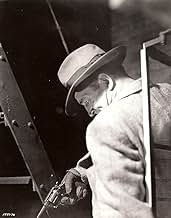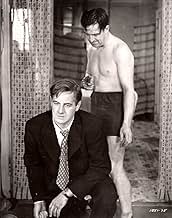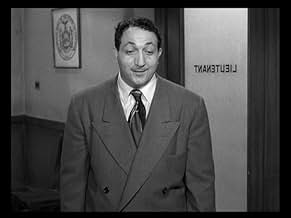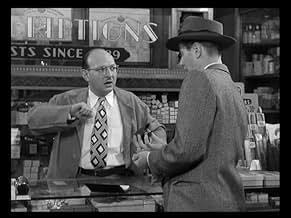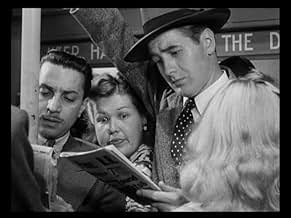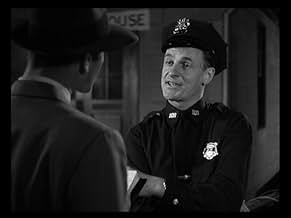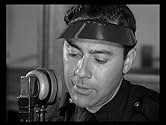IMDb-BEWERTUNG
7,5/10
16.405
IHRE BEWERTUNG
Ein Schritt-für-Schritt-Blick auf eine Morduntersuchung auf den Straßen von New York.Ein Schritt-für-Schritt-Blick auf eine Morduntersuchung auf den Straßen von New York.Ein Schritt-für-Schritt-Blick auf eine Morduntersuchung auf den Straßen von New York.
- 2 Oscars gewonnen
- 6 Gewinne & 5 Nominierungen insgesamt
Ted de Corsia
- Willy Garzah
- (as Ted De Corsia)
Mark Hellinger
- Narrator
- (Synchronisation)
Jean Adair
- Little Old Lady
- (Nicht genannt)
Celia Adler
- Dress Shop Proprietress
- (Nicht genannt)
Janie Alexander
- Girl
- (Nicht genannt)
Joyce Allen
- Shopgirl
- (Nicht genannt)
Beverly Bayne
- Mrs. Stoneman
- (Nicht genannt)
Empfohlene Bewertungen
In New York, the model Jean Dexter is found dead in the bathtub of her apartment apparently after committing suicide. However, the coroner concludes that she was actually murdered with a simulation of suicide. The experienced Homicide Lieutenant Detective Dan Muldoon (Barry Fitzgerald) initiates his investigations with Detective Jimmy Halloran (Don Taylor) and his team, and the prime suspect becomes Jean's friend Frank Niles (Howard Duff), who he an alibi but tells many lies in his statement.
The director Jules Dassin from the masterpiece "Du Rififi Chez Les Hommes" and "Night and the City" presents "The Naked City" totally filmed in locations of New York City and with actors interacting with common people on the streets like in the Italian Neo-Realism. The introduction is unique, with the credits narrated by the producer Mark Hellinger like in a documentary, and I do not recall any other movie with this characteristic. The screenplay discloses a great detective story, very well acted with Barry Fitzgerald playing a cynical and smart lieutenant and Don Taylor an inexperienced and family man detective. In the conclusion, the narrator tells that this is one of the 8,000,000 stories of the naked city, in a time where New York City had only this population (against more than 20 million inhabitants of the present days). My vote is eight.
Title (Brazil): "Cidade Nua" ("Naked City")
Note: On 27 May 2016, I saw this film again.
The director Jules Dassin from the masterpiece "Du Rififi Chez Les Hommes" and "Night and the City" presents "The Naked City" totally filmed in locations of New York City and with actors interacting with common people on the streets like in the Italian Neo-Realism. The introduction is unique, with the credits narrated by the producer Mark Hellinger like in a documentary, and I do not recall any other movie with this characteristic. The screenplay discloses a great detective story, very well acted with Barry Fitzgerald playing a cynical and smart lieutenant and Don Taylor an inexperienced and family man detective. In the conclusion, the narrator tells that this is one of the 8,000,000 stories of the naked city, in a time where New York City had only this population (against more than 20 million inhabitants of the present days). My vote is eight.
Title (Brazil): "Cidade Nua" ("Naked City")
Note: On 27 May 2016, I saw this film again.
An unrealized project of Alfred Hitchcock's was to make a movie about 24 hours in the life of a great city, probably New York. Producer Mark Hellinger enlisted director Jules Dassin to attempt a similar stunt. The result was The Naked City, a slice-of-life police procedural that served as template for the popular television series a decade later. And while the movie is nowhere near the ground-breaking cinematic enterprise that Hellinger promises in his introduction and ceaseless voice-over narration, it's not negligible. With its huge cast (many of them recognizable, even in mute or walk-on roles) and pioneering location shooting on the sidewalks of New York during the sweltering summer of 1947, it nonetheless continues to satisfy. Its documentary aspect outlives its suspense plot.
It opens with two men chloroforming and then drowning a high-profile model in her city apartment (shades of I Wake Up Screaming and Laura). When her cleaning lady finds her next morning, it falls to Detective Lieutenant Barry Fitzgerald, with his heather-honey lilt, and his principal investigator, Don Taylor, to fit the pieces together. Soon into their web flits Howard Duff, an affable, educated loafer with no visible means of support who lies even when the truth would do him no harm. It seems he was on cozy terms with the deceased, even though he's engaged to one of her co-workers (Dorothy Hart). But although Duff's a poor excuse for a human being, nothing seems to stick to him, either. So the police slog on through the broiling day and soupy night, knocking on doors and flashing pictures of the dead girl. Their sleuthing takes them, and us, up and down the hierarchy of the city's eight million souls, from society dames and society doctors to street vendors and street crazies.
While the plot never rises out of the routine, these urban excursions give the movie its raffish texture and remain one of its chief pleasures. This was New York in the dawn of its post-war effloresence, a city where it was still common practice to live comfortably on modest average wages. The gap between East Side apartments and Lower East Side walkups, with the bathtub in the kitchen, doesn't yet seem impossible to cross. And its inhabitants burst on camera with a welter of accents and attitudes. Hellinger and Dassin must have enlisted the services of every character-actor and bit-player in the Tri-State area, and film buffs will have a trivia tournament in trying to pick them out.
The Naked City ends with a chase over hot pavements and a stand-off high up on one of the bridges spanning the East River. It's a great set-piece, of the sort that action movies are all but required to include, but the movie's strength proves more subtle it lies in its collection of sharply drawn vignettes (some of them, to be sure, little more than sentimental shtik). The Naked City is a rarity a major production where the day players outshine the stars.
It opens with two men chloroforming and then drowning a high-profile model in her city apartment (shades of I Wake Up Screaming and Laura). When her cleaning lady finds her next morning, it falls to Detective Lieutenant Barry Fitzgerald, with his heather-honey lilt, and his principal investigator, Don Taylor, to fit the pieces together. Soon into their web flits Howard Duff, an affable, educated loafer with no visible means of support who lies even when the truth would do him no harm. It seems he was on cozy terms with the deceased, even though he's engaged to one of her co-workers (Dorothy Hart). But although Duff's a poor excuse for a human being, nothing seems to stick to him, either. So the police slog on through the broiling day and soupy night, knocking on doors and flashing pictures of the dead girl. Their sleuthing takes them, and us, up and down the hierarchy of the city's eight million souls, from society dames and society doctors to street vendors and street crazies.
While the plot never rises out of the routine, these urban excursions give the movie its raffish texture and remain one of its chief pleasures. This was New York in the dawn of its post-war effloresence, a city where it was still common practice to live comfortably on modest average wages. The gap between East Side apartments and Lower East Side walkups, with the bathtub in the kitchen, doesn't yet seem impossible to cross. And its inhabitants burst on camera with a welter of accents and attitudes. Hellinger and Dassin must have enlisted the services of every character-actor and bit-player in the Tri-State area, and film buffs will have a trivia tournament in trying to pick them out.
The Naked City ends with a chase over hot pavements and a stand-off high up on one of the bridges spanning the East River. It's a great set-piece, of the sort that action movies are all but required to include, but the movie's strength proves more subtle it lies in its collection of sharply drawn vignettes (some of them, to be sure, little more than sentimental shtik). The Naked City is a rarity a major production where the day players outshine the stars.
This is a great Film Noir movie which I enjoyed very much. My favorite part is watching all the 100's of people on the streets on New York City not having a clue that the are immortalized in this motion picture. I love to freeze frame the street scenes and view how life was like in 1948. So many surprises, for example in the phone booth scene, notice the two men peering out the window in the store across the street. I think those guys were aware of the filming, but as the scene continued, they went back to serving their customers. Just plain magic. There is also a cool goof in this film. Note during the train station chase scene, just after Frank runs by, the director or a film crew member turns towards the camera and yells what I believe is "CUT"...So Fun....I'll see again and again and again!
THE NAKED CITY is like watching a time capsule unfold of New York City in the late '40s--the cars, the subways, the bridges, the people bustling along busy streets totally unaware of filming (scenes were shot from cars with tinted windows and two-way mirrors), and at the center of it all is a rather routine detective story. But the difference is the style that director Jules Dassin gets out of his material, giving the drama a chance to build up the proper tension before the final shootout on city streets and bridges.
BARRY FITZGERALD is the detective with the very helpful sidekick DON TAYLOR, a young police officer from Queens who helps him track down the man responsible for the death of a pretty blonde in what the tabloids called "The Bathtub Murder". Both men are excellent as they follow a batch of clues to get to the bottom of the crime. HOWARD DUFF is also excellent as a man mixed up in the robberies, with DOROTHY HART as his unsuspecting sweetheart.
TED DeCORSIA, making his film debut, is the athletic villain, working out in his small apartment when detective Taylor finds him--but soon making his escape which leads to the film's most breathtaking moments of a dazzling chase that fills the last ten minutes with high tension suspense.
The crime itself is not that interesting, but the style used to tell the tale (with a voice-over narration telling us at the conclusion that this is just one story in a city of millions) is what makes it far superior to most detective stories. That and the fact that New York City is given the spotlight for location photography that really hits the mark.
BARRY FITZGERALD is the detective with the very helpful sidekick DON TAYLOR, a young police officer from Queens who helps him track down the man responsible for the death of a pretty blonde in what the tabloids called "The Bathtub Murder". Both men are excellent as they follow a batch of clues to get to the bottom of the crime. HOWARD DUFF is also excellent as a man mixed up in the robberies, with DOROTHY HART as his unsuspecting sweetheart.
TED DeCORSIA, making his film debut, is the athletic villain, working out in his small apartment when detective Taylor finds him--but soon making his escape which leads to the film's most breathtaking moments of a dazzling chase that fills the last ten minutes with high tension suspense.
The crime itself is not that interesting, but the style used to tell the tale (with a voice-over narration telling us at the conclusion that this is just one story in a city of millions) is what makes it far superior to most detective stories. That and the fact that New York City is given the spotlight for location photography that really hits the mark.
There were quite a few reasons for wanting to see 'The Naked City'. Like Barry Fitzgerald in a lot of other films ('And Then There Were None' being my introduction to him and still consider his performance in that one of his best), though it was interesting to see him in a lead role rather than his relative usual supporting roles and an atypical one at that. Really like what has been seen so far of Jules Dassin's work, especially 'Night and the City'. Also wanted to see whether the film lived up to its highly influential reputation.
Good news is mostly 'The Naked City' does. One can see why 'The Naked City' was influential in its documentary style, which at the time and even by today's standards innovative, and how it is treated in a way that is driven by its characters and with an emphasis on the police and how they worked. And that makes it a highly interesting film and elevates that is fairly conventional, with familiar genre tropes, in the story department. Yet still makes a gripping film regardless of that.
Not many problems here, though for my tastes Don Taylor seemed bland and detached, not always looking very comfortable either.
Do think that the narration could have been used less, as some of it did not always feel needed.
Conversely, 'The Naked City' is immaculately photographed and New York, like its own character, is a major star here. The cinematography and editing Oscars were richly deserved. The haunting score adds hugely, as does Dassin's direction. Dassin is highly successful in creating an authentic, audacious and sometimes unsettling visual style. He is equally successful at keeping the story at a controlled, yet never in my mind mannered or tedious, way that sustains the suspense brilliantly.
Loved the layered tautness of the script outside of the narration, while the story is gripping and its intelligence, high suspense and a knockout of a final chase made me able to forgive that it was quite conventional. The opening sequence is a unique one. Outside of Taylor, didn't actually have an issue with the performances. Although an effective Fitzgerald has been widely talked about, on both sides of good and not so good (am in the former camp), for me the best performance came from chilling Ted De Corsia.
In conclusion, very good film and deservedly influential. 8/10
Good news is mostly 'The Naked City' does. One can see why 'The Naked City' was influential in its documentary style, which at the time and even by today's standards innovative, and how it is treated in a way that is driven by its characters and with an emphasis on the police and how they worked. And that makes it a highly interesting film and elevates that is fairly conventional, with familiar genre tropes, in the story department. Yet still makes a gripping film regardless of that.
Not many problems here, though for my tastes Don Taylor seemed bland and detached, not always looking very comfortable either.
Do think that the narration could have been used less, as some of it did not always feel needed.
Conversely, 'The Naked City' is immaculately photographed and New York, like its own character, is a major star here. The cinematography and editing Oscars were richly deserved. The haunting score adds hugely, as does Dassin's direction. Dassin is highly successful in creating an authentic, audacious and sometimes unsettling visual style. He is equally successful at keeping the story at a controlled, yet never in my mind mannered or tedious, way that sustains the suspense brilliantly.
Loved the layered tautness of the script outside of the narration, while the story is gripping and its intelligence, high suspense and a knockout of a final chase made me able to forgive that it was quite conventional. The opening sequence is a unique one. Outside of Taylor, didn't actually have an issue with the performances. Although an effective Fitzgerald has been widely talked about, on both sides of good and not so good (am in the former camp), for me the best performance came from chilling Ted De Corsia.
In conclusion, very good film and deservedly influential. 8/10
Wusstest du schon
- WissenswertesMost of the street scenes were shot on location in New York without the public's knowledge. Photographer William H. Daniels and his uncredited assistant Roy Tripp filmed people on the streets using a hidden camera from the back of an old moving van. Occasionally, a fake newsstand with a hidden camera inside was also set up on the sidewalk to secretly film the actors. Director Jules Dassin hired a juggler to distract the crowds and also hired a man to occasionally climb up on a light post and give a patriotic speech, while waving an American flag to get the crowd's attention.
- PatzerDuring the end pursuit, Garzah walks past a plump, dark-haired lady in a floral dress, pushing a baby in a stroller. As Donahue pursues in a following scene, he passes the same woman, now walking without her baby carriage and her left hand bandaged.
- Crazy CreditsThe opening credits are spoken by producer/narrator Mark Hellinger. No credits are seen on the screen.
- VerbindungenFeatured in Visions of Light (1992)
- SoundtracksSobre las Olas (Over the Waves)
(1887) (uncredited)
Written by Juventino Rosas
Background music for the girls on swings
Top-Auswahl
Melde dich zum Bewerten an und greife auf die Watchlist für personalisierte Empfehlungen zu.
- How long is The Naked City?Powered by Alexa
Details
- Erscheinungsdatum
- Herkunftsland
- Sprache
- Auch bekannt als
- La ciudad desnuda
- Drehorte
- Produktionsfirmen
- Weitere beteiligte Unternehmen bei IMDbPro anzeigen
Box Office
- Bruttoertrag in den USA und Kanada
- 2.400.000 $
- Laufzeit1 Stunde 36 Minuten
- Farbe
- Seitenverhältnis
- 1.37 : 1
Zu dieser Seite beitragen
Bearbeitung vorschlagen oder fehlenden Inhalt hinzufügen

Oberste Lücke
By what name was Stadt ohne Maske (1948) officially released in India in English?
Antwort

